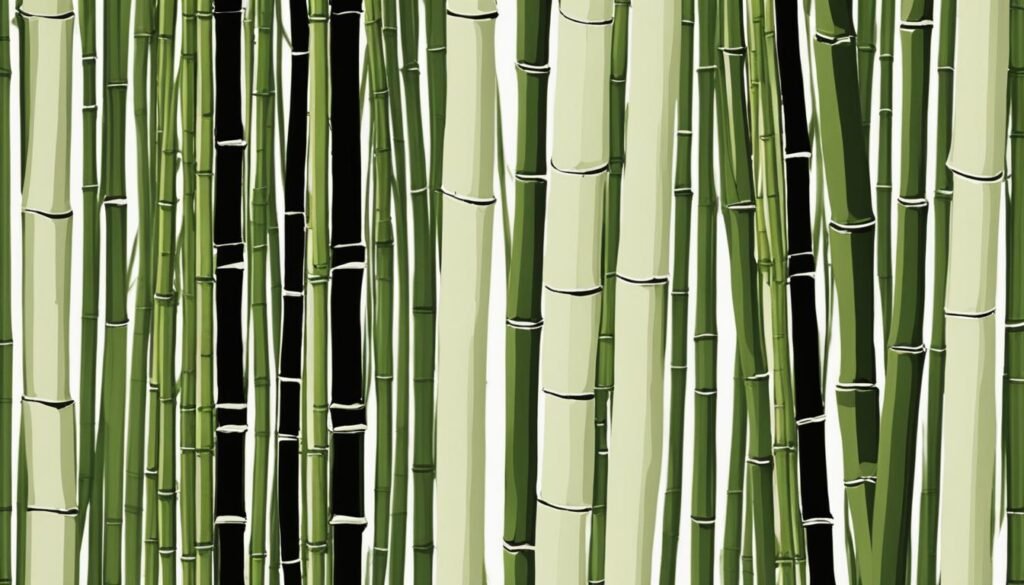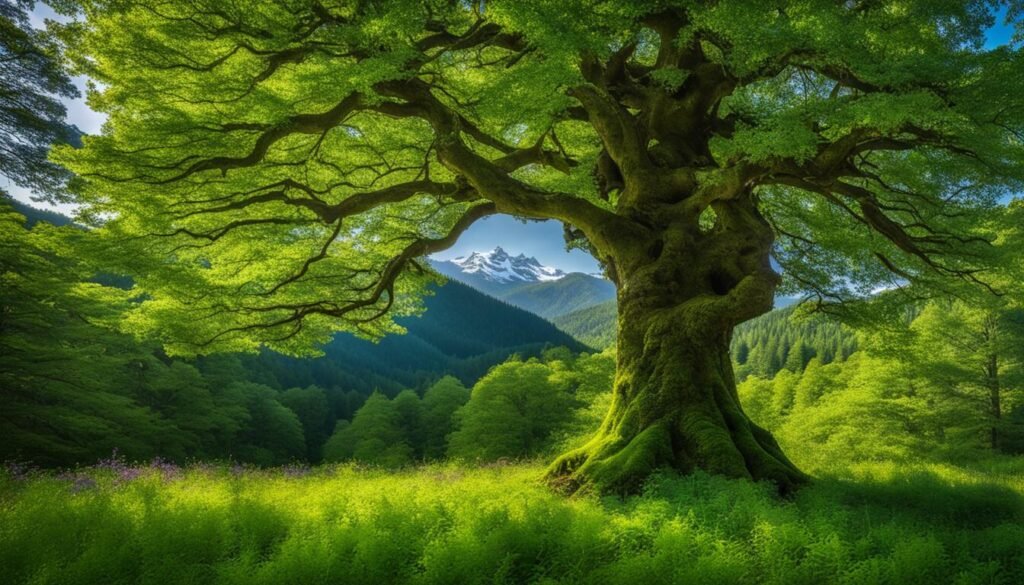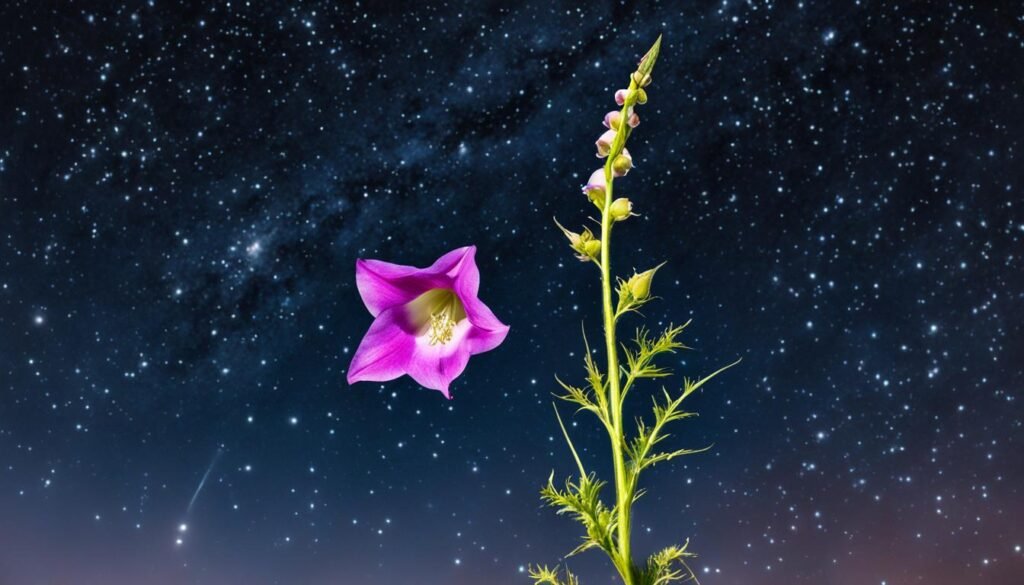As an astrologer, I’ve always been fascinated by the hidden meanings behind everyday objects. One such object that holds profound significance in astrology is bamboo. Often admired for its elegance and versatility, bamboo plants have a deeper spiritual and scientific meaning that can enrich our lives and living spaces. From symbolizing strength and resilience to attracting positive energy and promoting growth, bamboo is truly a cosmic wonder.
Key Takeaways:
- Bamboo symbolizes strength, resilience, and adaptability in astrology.
- It attracts positive energy, promotes harmony and prosperity, and reminds us of the importance of growth and self-improvement.
- Bamboo plants serve as natural air purifiers, reducing toxins and improving indoor air quality.
- Taking care of bamboo plants involves providing the right amount of light and water, occasional pruning, and repotting every couple of years.
The Symbolic Significance of Bamboo
Bamboo holds a revered place in numerous cultures worldwide, thanks to its profound symbolic significance. It embodies qualities such as strength, resilience, and flexibility, making it a powerful symbol in various belief systems. Just as bamboo can bend without breaking, it serves as a reminder of the human ability to adapt and withstand challenges.

Incorporating bamboo into your home invites these symbolic qualities into your life, fostering a deeper connection with your inner self and surroundings. Bamboo also represents growth and self-improvement, as it continuously reaches towards the sky. Its vertical growth symbolizes the constant strive for personal development and progress.
Strength and Resilience
Bamboo’s strength and resilience are not only physical but also metaphorical. Its sturdy structure and ability to withstand harsh conditions reflect our own capacity to endure and prevail amidst challenges. By surrounding ourselves with bamboo, we draw inspiration from its unwavering strength, reminding us of our own ability to overcome obstacles.
Flexibility and Adaptability
One of the most remarkable qualities of bamboo is its flexibility. As it sways with the wind, bamboo teaches us the importance of adaptability and going with the flow. It encourages us to embrace change and adjust our paths when necessary, without losing our core values and principles. Bamboo’s ability to bend without breaking symbolizes the power of adaptation and reminds us to remain resilient in the face of adversity.
Just as bamboo can bend without breaking, it serves as a reminder of the human ability to adapt and withstand challenges.
Drawing on the symbolism of bamboo, we can cultivate a mindset of strength, resilience, and adaptability. By incorporating bamboo into our living spaces, we create a physical representation of these qualities, serving as a constant reminder to embrace growth, develop inner strength, and navigate life’s challenges with grace.
| Symbolic Significance | Meaning |
|---|---|
| Strength | Bamboo represents inner strength and the ability to persevere. |
| Resilience | Symbolizes the capacity to endure and overcome adversity. |
| Flexibility | Bamboo teaches adaptability and the importance of going with the flow. |
| Adaptability | Represents the power to adjust and thrive in changing circumstances. |
| Growth | Symbolic of continuous personal development and improvement. |
Embracing the symbolic significance of bamboo enables us to tap into its transformative energy, fostering personal growth and resilience in our own lives. By incorporating bamboo into our surroundings, we create a sacred space that cultivates strength, adaptability, and an unwavering spirit.
The Spiritual Benefits of Bamboo Plants
Bamboo plants possess incredible spiritual benefits that can uplift your home and soothe your soul. By incorporating these graceful plants into your living space, you invite positive energy, harmony, and prosperity into your life.
One way to enhance your wealth and abundance is by placing a lucky bamboo plant in the wealth corner of your home or workspace. This symbolic gesture is believed to attract financial success and prosperity.
The presence of bamboo in your surroundings serves as a gentle reminder to prioritize personal growth and self-improvement. Just as bamboo continuously grows upwards, it encourages you to embrace the journey of personal development and strive for spiritual growth.
Bamboo has a unique ability to create a sense of balance and harmony, both in your physical environment and within yourself. Its calming energy reduces stress and enhances relaxation, allowing you to find inner peace.
With its connection to the earth and nature, bamboo helps you establish a deeper harmony with the world around you. Its presence encourages you to cultivate a closer bond with nature and appreciate the beauty of the natural world.
Embrace the spiritual benefits of bamboo plants and let their positive energy nurture your soul as you embark on a transformative journey of self-discovery.
“Bamboo has a unique ability to create a sense of balance and harmony, both in your physical environment and within yourself.”
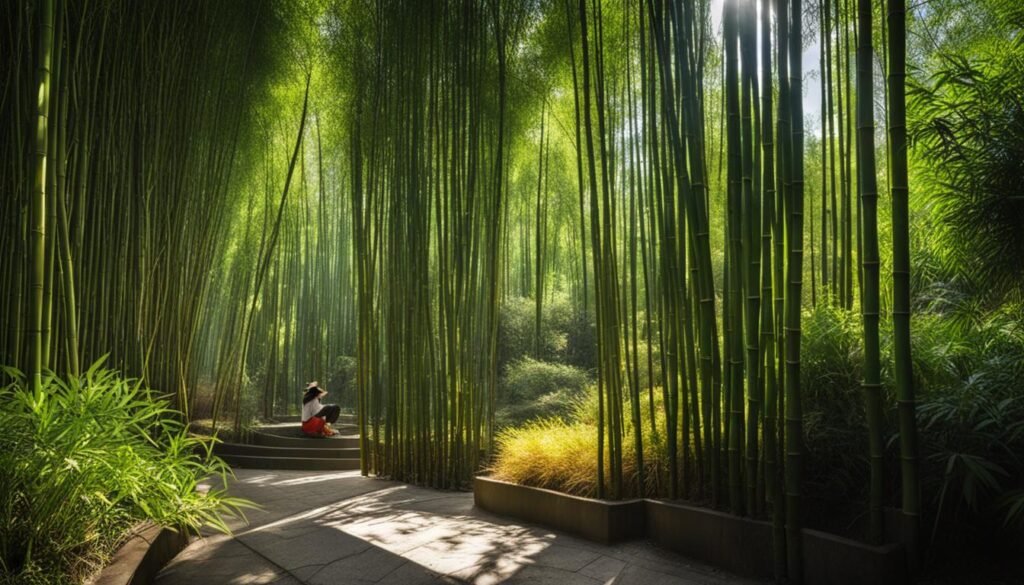
| Benefits | Description |
|---|---|
| Positive Energy | Bamboo plants attract positive energy, fostering a harmonious and uplifting atmosphere. |
| Harmony | The presence of bamboo promotes a sense of balance and tranquility, reducing stress and enhancing relaxation. |
| Prosperity | Placing a lucky bamboo plant in the wealth corner of your home or workspace is believed to attract financial abundance. |
| Spiritual Growth | Bamboo serves as a gentle reminder of the importance of personal development and encourages spiritual growth. |
The Scientific Benefits of Bamboo Plants
Bamboo plants offer a range of scientific benefits, making them a valuable addition to any indoor environment. Not only do they enhance the aesthetics of your living space, but they also contribute to a healthier and more harmonious atmosphere.
One of the significant advantages of bamboo plants is their ability to act as natural air purifiers. Scientific studies have shown that bamboo has the unique capability to filter indoor air, effectively absorbing harmful toxins and pollutants such as formaldehyde, benzene, and ammonia. By incorporating bamboo into your home, you can enjoy cleaner and fresher air, promoting a healthier living environment for you and your loved ones.
But the benefits of bamboo plants extend beyond mere air purification. The presence of plants, including bamboo, has been linked to the reduction of stress and anxiety levels. The visual appeal of bamboo, with its vibrant green leaves and graceful structure, creates a soothing and calming effect, allowing you to escape from the pressures of daily life. In this fast-paced world, having bamboo plants in your home can serve as a natural stress-reliever, providing a tranquil sanctuary where you can unwind and rejuvenate.
Moreover, bamboo plants play a crucial role in maintaining optimal indoor humidity levels. They release moisture into the air, preventing it from becoming too dry, which is beneficial for your skin and respiratory health. By having bamboo plants in your living space, you can enjoy the comfort of balanced humidity levels, reducing the risk of dry skin, allergies, and respiratory problems.
| Scientific Benefits of Bamboo Plants | |
|---|---|
| Air purification | Bamboo filters indoor air, absorbing toxins and pollutants. |
| Stress reduction | The presence of bamboo plants promotes a calming and soothing environment, reducing stress and anxiety levels. |
| Optimal indoor humidity | Bamboo helps maintain a balanced humidity level, preventing dry skin and respiratory problems. |
With their air purification properties, stress-reducing effects, and contribution to maintaining optimal indoor humidity, bamboo plants offer both aesthetic and scientific benefits. Embracing the presence of bamboo in your home can significantly enhance your well-being and create a serene and harmonious environment.
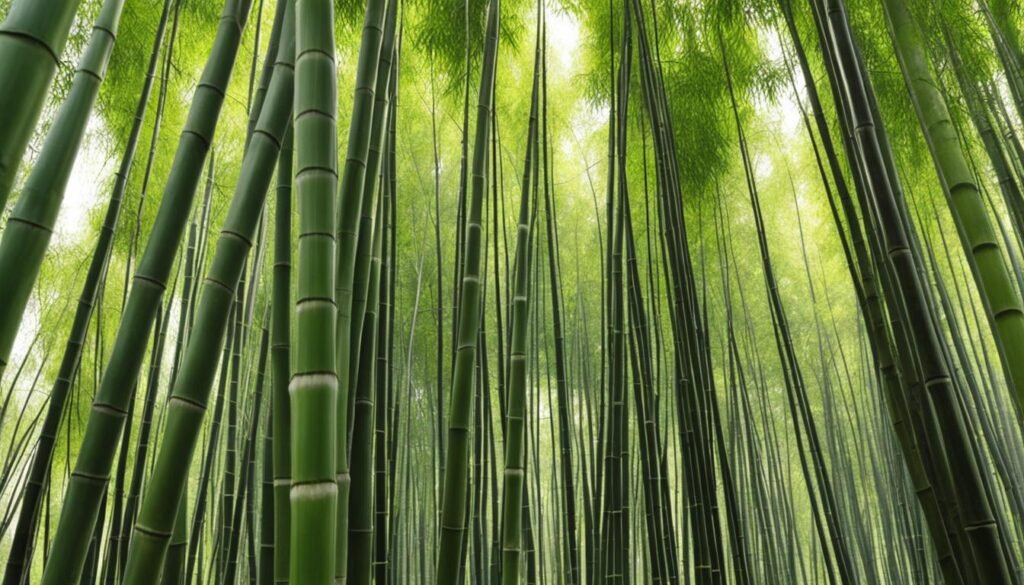
Caring for Your Bamboo Plants
Proper care is essential to ensure the well-being and longevity of your bamboo plants. By providing them with the right amount of light and water, you can help these beautiful plants thrive and beautify your living spaces.
Light Requirements:
Most bamboo varieties prefer indirect sunlight. Placing your bamboo plant near a window with filtered or dappled light is ideal. Avoid exposing the plant to direct sunlight for extended periods, as it can scorch the leaves.
Watering Tips:
Watering is crucial to maintain the health of your bamboo plants. It’s best to keep the soil consistently moist but not waterlogged. Overwatering can lead to root rot and other issues, while underwatering can cause the leaves to turn brown and dry out.
Here’s a general watering guideline:
| Bamboo Variety | Watering Frequency |
|---|---|
| Clumping Bamboo | Water every 2-3 days |
| Running Bamboo | Water every 1-2 days |
Remember to adjust the watering frequency based on the climate, humidity levels, and the specific needs of your bamboo plant.
Pruning:
Regular pruning is necessary for maintaining the health and appearance of your bamboo plants. Remove yellow or damaged leaves using clean pruning shears. Pruning promotes new growth and prevents any potential diseases or pests from spreading.
Repotting:
Every couple of years, consider repotting your bamboo plant to provide it with fresh nutrients and ample space to grow. Select a pot that is slightly larger than the current one, ensuring proper drainage to prevent waterlogging.
TIP: When repotting, use a well-draining potting mix specifically formulated for bamboo plants to provide the necessary nutrients and support healthy growth.
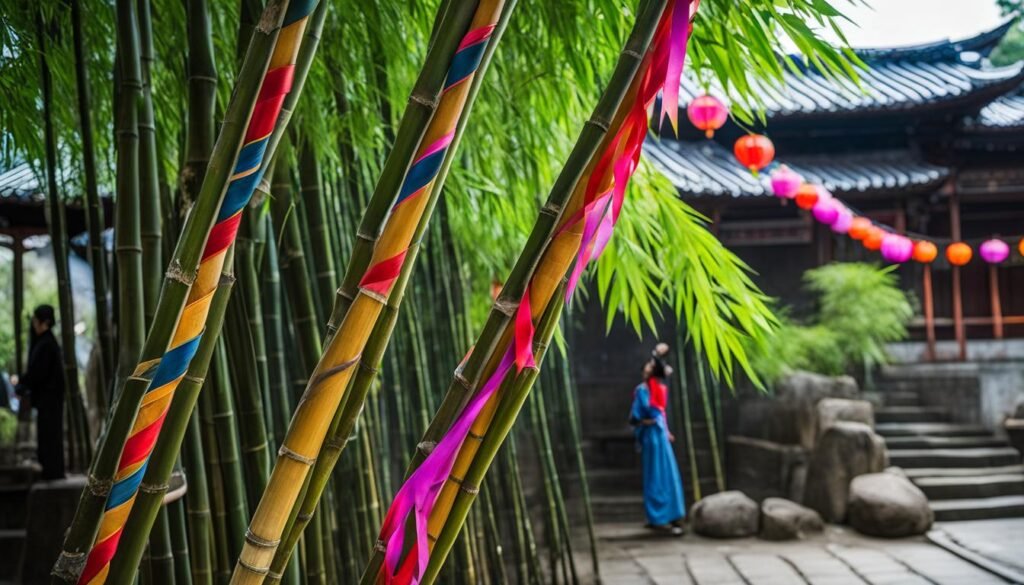
| Region | Beliefs/Taboos |
|---|---|
| Bangladesh | A small piece of bamboo is hung above graves to ward off evil spirits. |
| Central Nepal | Planting bamboo is banned due to the belief that its shadow invites the Yamraj spirit of Death. |
| Kerala, India | Bamboo-growing taboo associated with infertility. Planting bamboo in front of houses is avoided. |
| Beliefs related to vermin and pests | There are beliefs that bamboo groves attract vermin and pests, thus avoiding planting bamboo in certain regions. |
Bamboo Symbolism in China
In China, bamboo holds a special place in the hearts and minds of its people. It is revered as an auspicious symbol associated with strength, good luck, prosperity, and longevity. The deep-rooted cultural significance of bamboo in China is reflected in various aspects of life, from art and literature to traditional practices.
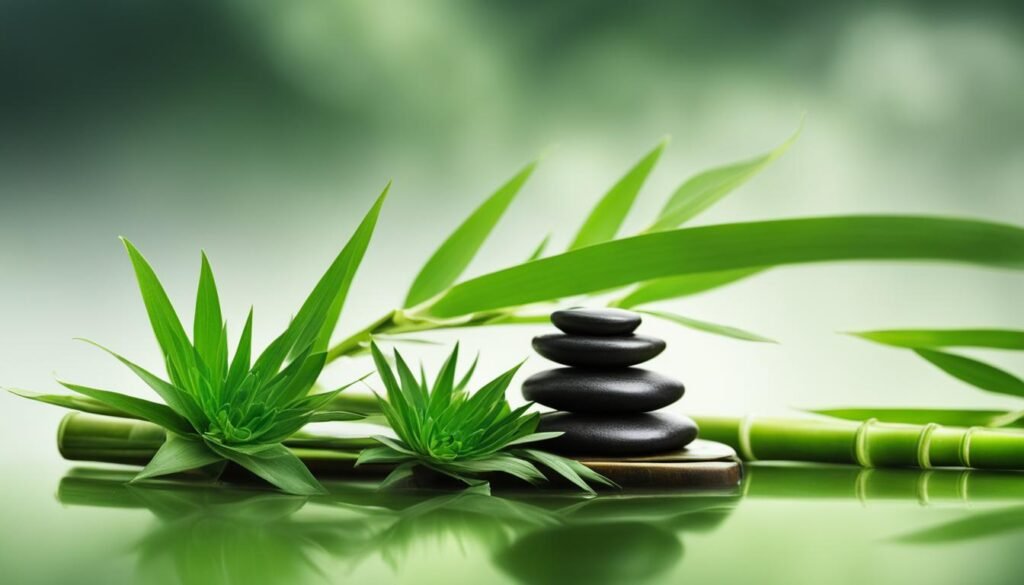
One of the most well-known representations of bamboo’s symbolism in China is the use of lucky bamboo. Arrangements of bamboo stalks, often found in homes and businesses, carry different meanings depending on the number of stalks. For example, a lucky bamboo arrangement with two stalks represents love and is believed to invite harmonious relationships. On the other hand, an arrangement with three stalks symbolizes happiness and is said to bring joy and good fortune.
Bamboo is also believed to have a protective effect against evil spirits, making it a common feature in traditional Chinese homes. The leaves of the bamboo plant are traditionally used to clean the house, as they are believed to drive out negative energy and ward off evil spirits.
Furthermore, bamboo is deeply ingrained in Chinese culture as one of the “Four Gentlemen,” which are associated with model male behavior. The other three gentlemen are the orchid, plum blossom, and chrysanthemum. Bamboo represents strength, resilience, and integrity, serving as a reminder of the virtues cherished in Chinese society.
In summary, bamboo holds great significance and symbolism in China, representing strength, good fortune, prosperity, and longevity. Its presence in homes and cultural practices reflects the Chinese people’s deep-rooted beliefs and values.
| Symbolic Meanings of Bamboo in China | Number of Stalks in Lucky Bamboo Arrangements |
|---|---|
| Good fortune | 2 stalks |
| Love and harmony | 2 stalks |
| Happiness and joy | 3 stalks |
| Wealth and prosperity | 5 or more stalks |
| Growth and success | 6 or more stalks |
Bamboo in Japan
In Japan, bamboo holds deep cultural significance and is associated with strength, goodness, and transformation. It has a rich presence in Japanese folklore, art, and culture, reflecting its revered status in the country.
A common sight in Japan is bamboo groves near Shinto shrines and Buddhist temples, where they are considered sacred. These groves create a serene and spiritual atmosphere, inviting visitors to connect with nature and find solace.
Japanese folktales often feature woodcutters or childless families discovering a child with magical qualities hidden within a bamboo grove. These stories symbolize transformative journeys and the power of bamboo to provide unexpected blessings and miracles.
The most famous tale featuring bamboo in Japan is “The Tale of the Bamboo Cutter.” This ancient narrative tells the story of a princess who emerges from a bamboo section and captivates the hearts of those around her. It highlights the enchanting allure and transformative possibilities that bamboo represents in Japanese culture.
Bamboo is admired for its resilience and ability to thrive under harsh conditions. It is even celebrated as one of the “Three Friends of Winter” alongside the pine and plum blossom, representing strength and fortitude during challenging times.
| Bamboo in Japanese Art and Culture | Bamboo Symbolism in Japan |
|---|---|
|
– Bamboo has been a popular subject in traditional Japanese art, including paintings, calligraphy, and ceramics. Its elegant and simplistic beauty is often depicted in intricate brushstrokes. – Bamboo is celebrated in various traditional Japanese crafts, such as bamboo basketry (woven bamboo), bamboo tea ceremony utensils, and bamboo ink brushes used in calligraphy. – The bamboo plant is a source of inspiration in Japanese gardens, with its vertical lines and swaying foliage adding a sense of tranquility and grace. |
– Bamboo symbolizes strength, endurance, and resilience in Japanese culture. – It represents the ability to adapt and bend without breaking, emphasizing the value of flexibility and harmony. – Bamboo is also associated with growth and transformation, reminding individuals of the importance of continuous self-improvement. |
Bamboo holds a deep spiritual significance in Japan, serving as a reminder of the profound connection between humans and nature. Its symbolism and presence in Japanese folklore, art, and culture continue to inspire and captivate both locals and visitors.

| Symbolism | Meaning |
|---|---|
| Youth | Bamboo symbolizes the energy and vitality of youth. |
| Flexibility | Like bamboo’s ability to bend without breaking, flexibility is a valued trait in Southeast Asian cultures. |
| Love | Bamboo is often associated with romance, emphasizing the transformative power of love. |
The Dragon and Bamboo Symbolism
In Asian cultures, the dragon is a powerful symbol associated with strength, goodness, and transformation. It holds a revered position, often depicted in ancient stories and artworks. Similarly, bamboo plays a significant role in symbolism, and its connection with the dragon carries deep meaning.

Just as the dragon soars high in the sky, bamboo stands tall and strong. Together, they represent qualities of resilience, growth, and adaptability.
In jade carvings, bamboo frequently appears alongside the dragon, creating a harmonious blend of symbolism. This combination signifies not only the dragon’s strength and power but also the purity and fertility associated with bamboo. It represents the union of masculine and feminine energies, symbolizing marital bliss, harmony, and procreation.
The dragon, often depicted reaching for or guarding the pearl of wisdom, signifies enlightenment and the pursuit of knowledge. This connection with wisdom further emphasizes the transformative nature of the dragon, as it inspires growth and personal development.
The dragon holds a prominent position in the Chinese zodiac as the fifth mythical creature. Individuals born in the Year of the Dragon are believed to possess qualities such as enthusiasm, strength, and vitality. Their presence brings positive energy and a sense of excitement.
Bamboo and the Dragon: A Symbolic Partnership
The dragon and bamboo share a mystical bond that exemplifies the transformative journey of life. Just as bamboo undergoes growth and change, the dragon represents the backdrop of each transformation. The dragon’s ability to shape-shift and change form resonates with the ever-evolving nature of human existence.
“In the vibrancy of the dragon and the resilience of bamboo lies the power to adapt, evolve, and embrace the transformative journey of life.” – Anonymous
To truly comprehend the mysticism of the dragon and bamboo, one can look to jade carvings that depict fish transforming into dragons. This symbolism represents the transition from a student to an adult, embracing new responsibilities, and embarking on a transformative phase.
Overall, the dragon and bamboo partnership holds a profound spiritual significance. It encourages individuals to embrace change, harness their inner strength, and embark on a transformative journey towards enlightenment and personal growth.
The Year of the Dragon Personality
The Year of the Dragon in the Chinese zodiac represents an enthusiastic, larger-than-life, healthy, and stubborn personality. Dragon people are flamboyant, attractive, and full of strength and vitality. They possess natural leadership skills and see the potential in even the smallest projects. Dragon people have high standards for themselves and others, often aiding friends and family in times of need. Their energy, intellect, and talents enable them to accomplish their highest goals.
| Characteristics of Dragon Zodiac Sign | Dragon People Traits |
|---|---|
| Dominant | Dragon people have a dominant and influential presence. They naturally take charge and have leadership qualities. |
| Charismatic | Dragon people are charismatic and attract others effortlessly. Their strong personality and magnetic charm make them popular among friends and acquaintances. |
| Adventurous | Dragon people are adventurous and love trying new things. They are not afraid to take risks and often seek thrilling experiences. |
| Confident | Dragon people are highly confident in their abilities. They believe in themselves and their potential to achieve greatness. |
| Determined | Dragon people are incredibly determined and do not easily give up. They have a strong willpower to overcome obstacles and achieve their goals. |
| Generous | Dragon people have a generous nature and are always willing to help others. They are known for their kindness and compassion. |
| Passionate | Dragon people are passionate about everything they do. They put their heart and soul into their endeavors, resulting in exceptional accomplishments. |
| Stubborn | Dragon people can be stubborn and persistent. Once they set their mind on something, it is challenging to change their opinion or direction. |
“Dragon people are like the mythical creature they represent—bold, fierce, and awe-inspiring. Their dynamic personality and unwavering determination make them a force to be reckoned with.”
Dragon people are born leaders who inspire others through their passion and charisma. Their vibrant energy and zest for life make them natural influencers, driving change and igniting others’ motivation. With their captivating personality and unwavering drive, Dragon people leave a lasting impression wherever they go.
Dragon Compatibility
Dragon people are compatible with Rat, Monkey, and Rooster. These signs often share the Dragon’s zest for life and have the ability to keep up with their boundless energy and enthusiasm. However, relationships with other Dragon individuals may result in clashes of ego and dominance.
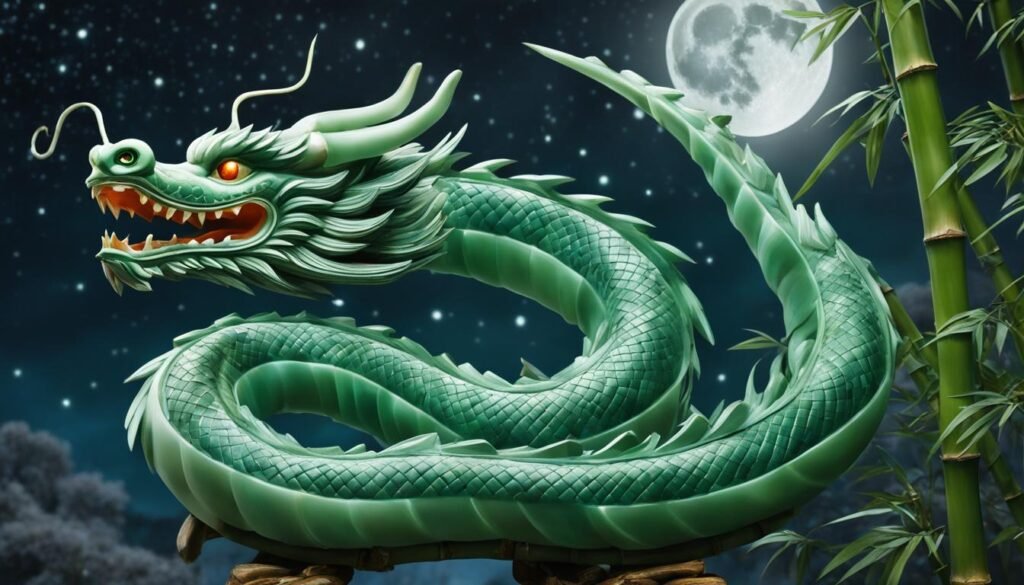
Dragon and Bamboo Symbolism
“The dragon and bamboo symbolize powerful transformations and the pursuit of wisdom.”
The dragon, with its strength and goodness, is deeply revered in Asian cultures. It epitomizes the transformative journey of the self, while the bamboo represents fertility, marital bliss, and procreation. Combining these elements, owning a jade dragon pendant becomes a symbolic representation of one’s personal journey towards transformation, embracing the qualities of the dragon and the resilience of bamboo.
| Jade Dragon Symbolism | Bamboo Symbolism |
|---|---|
| • Represents strength, goodness, and transformation | • Symbolizes resilience, adaptability, and growth |
| • Connection to wisdom and enlightened knowledge | • Associated with fertility, marital bliss, and procreation |
“The combination of the dragon and bamboo encapsulates the transformative power of strength and adaptability.”
By embracing the mysticism of the dragon and bamboo, one embarks on a transformative journey that transcends physical limitations. It is a constant reminder to continuously adapt to life’s challenges and embrace personal growth. The symbolism tied to the dragon and bamboo serves as a guidepost, encouraging individuals to evolve, gain wisdom, and nurture their inner strength.
Conclusion
Incorporating bamboo plants into your home is a harmonious way to blend spirituality and science, unlocking the significance of bamboo in astrology and unveiling its cosmic secrets. Bamboo’s symbolic meaning of strength, resilience, and adaptability fosters a deeper connection with your inner self and surroundings, bringing positivity and natural beauty into your life.
Beyond its symbolism, bamboo offers transformative effects through its scientific benefits. As a natural air purifier, bamboo enhances indoor air quality by reducing toxins and creating a calmer living environment. Its calming effect also helps reduce stress and anxiety, promoting well-being and peace of mind.
By nurturing bamboo in your home, you invite the transformative energy of this remarkable plant. Embrace the tranquil presence of bamboo and witness its ability to promote growth, balance, and prosperity in your space, allowing for a deeper connection with nature and yourself.
FAQ
What does bamboo mean in astrology?
Bamboo is not directly associated with any zodiac sign or astrological meaning. However, it does hold symbolic significance in various cultures and belief systems.
What is the symbolism of bamboo in astrology?
Bamboo symbolizes strength, resilience, flexibility, and adaptability. It represents growth, self-improvement, and the ability to thrive in challenging situations.
What are the spiritual benefits of bamboo plants?
Bamboo plants attract positive energy, promote harmony, balance, and prosperity. They serve as reminders of the importance of growth, self-improvement, and spiritual development.
What are the scientific benefits of bamboo plants?
Bamboo plants act as natural air purifiers, filtering toxins and improving indoor air quality. They also release moisture, maintaining optimal humidity levels and creating a calming effect that reduces stress and anxiety.
How do I care for bamboo plants?
To care for bamboo plants, provide them with indirect sunlight, regular watering to keep the soil moist but not waterlogged, and occasional pruning. Repotting every couple of years is also recommended.
What is the cultural and belief significance of bamboo?
Bamboo holds different meanings in various cultures. It is celebrated in China and Japan for its auspicious symbolism, but in certain regions of Nepal, India, and Bengal, bamboo is avoided due to its associations with evil spirits or death.
What is the symbolism of bamboo in China?
Bamboo is considered an auspicious symbol in China, associated with strength, good luck, prosperity, and longevity. The number of bamboo stalks in lucky bamboo arrangements represents different qualities such as wealth, love, and growth.
What is the symbolism of bamboo in Japan?
In Japan, bamboo is associated with strength, goodness, and transformation. It is considered sacred and often found near shrines and temples. Bamboo has deep spiritual significance in Japanese culture.
What is the symbolism of bamboo in Southeast Asian cultures?
Bamboo is associated with youth, flexibility, and love in Southeast Asian cultures. It plays a role in creation myths and legends, representing the origins of humanity and the power of transformation.
What is the symbolism of the dragon and bamboo?
The dragon and bamboo are often depicted together in Asian symbolism. They symbolize strength, goodness, transformation, fertility, and procreation. The dragon is associated with wisdom, while bamboo represents perseverance under harsh conditions.
What are the characteristics of the Year of the Dragon personality?
People born in the Year of the Dragon are described as enthusiastic, strong, and charismatic. They possess natural leadership skills, high standards, and a zest for life. Dragon individuals are known for their vitality and the potential they see in every endeavor.
What is the mysticism of the dragon and bamboo?
The dragon and bamboo symbolize transformative journeys and personal growth. Jade dragon pendants, in particular, are believed to represent the dragon’s ability to change form and its pursuit of enlightened knowledge.
No conclusion. The answer ends here.

